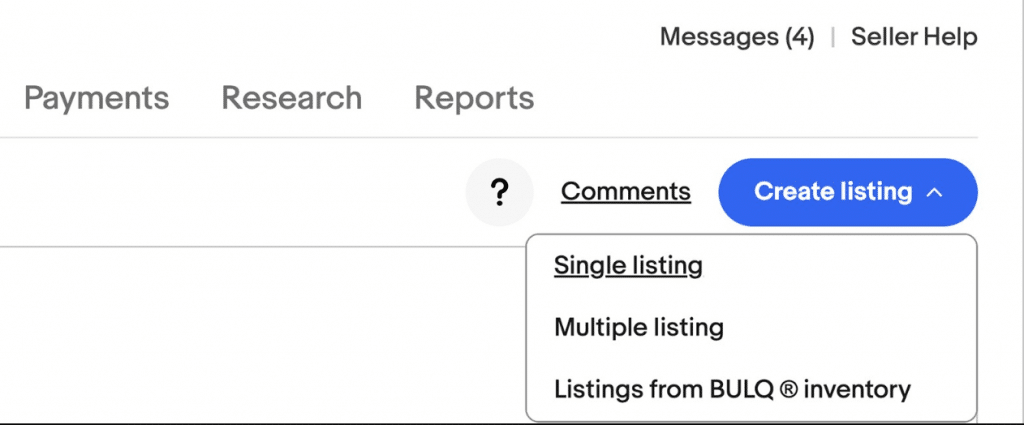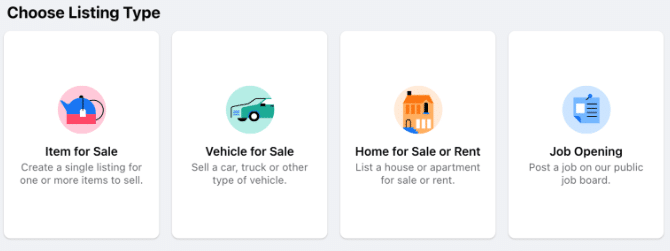eBay vs. Facebook Marketplace: A Comparative Guide for Sellers

In today's digital age, online marketplaces offer sellers vast opportunities to reach a wider audience and boost sales. eBay and Facebook Marketplace are two prominent platforms in the e-commerce landscape, each with its unique features and advantages for sellers.
Choosing the right platform can significantly impact a seller's success, making it crucial to understand the key differences between eBay and Facebook Marketplace. This article aims to provide a comprehensive comparative guide for sellers, helping them make an informed decision that aligns with their business objectives.
Related Reading: eBay vs. Etsy: A Comprehensive Comparison for Sellers
Account and Listing Creation: Facebook vs. eBay
A streamlined and user-friendly account creation process, along with a simple listing procedure, can attract more sellers and buyers, enhancing the overall user experience and platform's success.
How to Set Up an eBay Account
Setting up an eBay seller account is a straightforward process. Sellers just need to provide the required information and verify to ensure the authenticity of the account.
eBay provides a user-friendly interface for listing products. Sellers can create detailed product descriptions, add images, set pricing options, and define shipping preferences. The platform also offers various listing formats, such as auctions or fixed-price sales, enabling sellers to tailor their approach based on their selling strategy.

How to Set Up a Listing on Facebook Marketplace
To get started with Selling on Facebook Marketplace, you'll need a personal Facebook account. If you don't have one already, you can sign up for Facebook Marketplace here.
Fortunately, becoming a seller on Facebook Marketplace is a straightforward process, and you won't need any additional documents to get started. Simply create a dedicated seller profile within your existing Facebook account, and you're ready to list your items for sale.
Sellers can upload images, add product descriptions, set prices, and select categories to reach the right audience. The platform's integration with Facebook's social network allows sellers to leverage their connections and local communities to increase visibility.

Managing Inventory and Customer Concerns
Both eBay and Facebook offer robust inventory management tools, enabling sellers to efficiently track and manage their product listings.
eBay allows sellers to monitor stock levels and set automatic reorder points.It also provides a messaging system that allows seamless communication between sellers and potential buyers.
In the event of disputes or issues with buyers, eBay offers a structured resolution process. Sellers and buyers can open cases, and eBay acts as an intermediary to resolve conflicts fairly, ensuring a level of security for both parties.
On the other hand, Facebook Marketplace is oriented more towards local sales. Unfortunately, sellers have to monitor their inventory manually because Facebook does not provide dedicated inventory management tools.
Communication on Facebook Marketplace occurs primarily through Facebook Messenger. Sellers can promptly respond to inquiries, provide information, and engage with potential buyers to finalize sales.
Resolving disputes on Facebook Marketplace is less formalized than on eBay. Sellers are encouraged to address concerns directly with buyers, aiming for an amicable resolution. Escalating disputes might involve seeking support from Facebook, but it lacks the structured case resolution process of eBay.
Marketplace vs. eBay: Seller Fees
While eBay employs a structured fee system with various pricing tiers, Facebook Marketplace generally offers free listings but may introduce optional fees for certain selling enhancements or promotions.
eBay Seller Fees
Breakdown of eBay seller fees
The seller fees on eBay typically consist of the following components:
a. Insertion Fees: These are charges imposed for listing items on eBay. Generally, sellers receive a certain number of free listings each month, but additional listings beyond the allocated limit incur an insertion fee.
b. Final Value Fees: eBay charges a percentage of the final selling price (including shipping costs) as a final value fee. This fee varies, depending on the product category and the total amount of the sale.
c. Optional Listing Upgrades: eBay offers various optional listing upgrades like bolding, highlighting, and enabling larger photos, each with its own associated fee.
Fee structure for different types of listings
The fee structure on eBay varies depending on the type of listing a seller chooses. Here's a brief overview of the different types of listings and how fees are applied:
a. Fixed-Price Listings: For fixed-price listings, sellers are charged an insertion fee upfront, and then a final value fee is applied once the item sells.
b. Auction-Style Listings: Auction-style listings also incur an insertion fee, but the final value fee is based on the final auction price.
c. Store Subscriptions: eBay offers various store subscription levels, each with its own benefits and fee discounts. Sellers who operate a high volume of listings can save on fees with a store subscription.
Facebook Marketplace Seller Fees
Unlike eBay, Facebook Marketplace generally does not impose direct fees on sellers for listing their products on the platform. At the time of writing, most individual sellers can list items for free without incurring any upfront charges. Facebook Marketplace primarily operates on a fee-free model for individual sellers.
It's worth noting that while listing items is usually free, certain business-oriented features or promotions come with associated costs. Additionally, it's important to distinguish between Facebook Marketplace and Facebook Shops. While Marketplace allows individual sellers to list items for free, Facebook Shops, as depicted in the screenshot, provides businesses with a more robust e-commerce platform and may involve different fee structures.
Return Policies and Buyer Protection: eBay vs. Facebook Marketplace
eBay has a comprehensive standard return policy that aims to protect buyers and provide them with a consistent shopping experience. According to this policy, sellers are encouraged to accept returns within a specified period, typically 30 days. Sellers do have the option to set their own return policies, but they must be clearly stated in the item description.
To bolster buyer confidence, eBay offers the “Money Back Guarantee” program. Under this policy, if a buyer receives an item that doesn't match the listing description, is damaged, or doesn't arrive at all, eBay will ensure the buyer gets a full refund, including the original shipping costs.
When a buyer initiates a return, eBay facilitates the process by providing clear instructions and guidelines. Sellers can then review the return request and respond accordingly. To protect sellers, eBay takes various factors into account, including the item's condition and whether the return adheres to the seller's stated return policy. This helps prevent fraudulent returns and protects sellers from unwarranted losses.
On the other hand, Facebook Marketplace transactions are typically conducted between users directly, without an intermediary payment system. As such, the platform doesn't offer a standardized return policy like eBay. Instead, returns and refunds on Facebook Marketplace are subject to the mutual agreement of the buyer and seller involved in the transaction.
In the absence of a structured return policy, resolving buyer complaints and disputes on Facebook Marketplace relies heavily on effective communication between the parties involved. If an issue arises, it's essential for both the buyer and seller to engage in open dialogue to find a resolution that satisfies both parties.
Pros and Cons of eBay and Facebook Marketplace
| eBay | Facebook Marketplace | |
| Pros | ✔️Wide User Base: Extensive reach and potential for higher sales. | ✔️Large User Base: Access to a vast audience due to Facebook's popularity. |
| ✔️Established Platform: Trusted and well-known for online auctions. | ✔️Social Integration: Ability to leverage social networks for visibility. | |
| ✔️Seller Protection: Strong policies and resolution center for disputes. | ✔️Local Sales: Convenient for selling to nearby buyers and arranging pickup. | |
| ✔️Variety of Listing Options: Auctions, fixed-price, and multiple categories. | ✔️Ease of Use: User-friendly interface, simple listing process. | |
| ✔️Global Shipping Program: Streamlined international sales. | ✔️No Listing Fees: Free to post items, reducing upfront costs. | |
| Cons | ❌Fees and Costs: Listing, final value, and PayPal transaction fees. | ❌Limited Seller Support: provides fewer seller tools and resources which may hinder sellers in managing their businesses effectively. |
| ❌Competition: High number of sellers may lead to lower item prices. | ❌Payment Risks: Lack of built-in payment protection like eBay. | |
| ❌Shipping Hassles: Managing shipping and potential delays. | ❌Limited Category Options: Not as diverse as eBay's listing categories. | |
| ❌Feedback Impact: Negative reviews can affect seller reputation. | ❌Lower Trust Factor: Some users may be skeptical of private sellers. | |
| ❌Time-Consuming: Auctions require time monitoring and customer interaction. | ❌Less Security: No seller protection program comparable to eBay's. |
eBay and Facebook Marketplace are both widely used online platforms for buying and selling goods. eBay offers a vast user base and global reach, but it involves transaction fees and potential competition from other sellers. In contrast, Facebook Marketplace provides a more localized experience with no listing fees, but it may lack the same level of buyer protection and security measures as eBay.
Conclusion
eBay and Facebook Marketplace have distinct advantages and drawbacks. eBay boasts a wide user base and seller protection, while Facebook Marketplace offers a large audience and local sales convenience. The choice depends on individual seller needs, such as item type and risk tolerance. There is no one-size-fits-all answer, and sellers must carefully weigh the pros and cons to make the best decision for their specific selling goals.
Taking these factors into account will empower sellers to make an informed choice between eBay and Facebook Marketplace, optimizing their chances of success in the online selling landscape.



